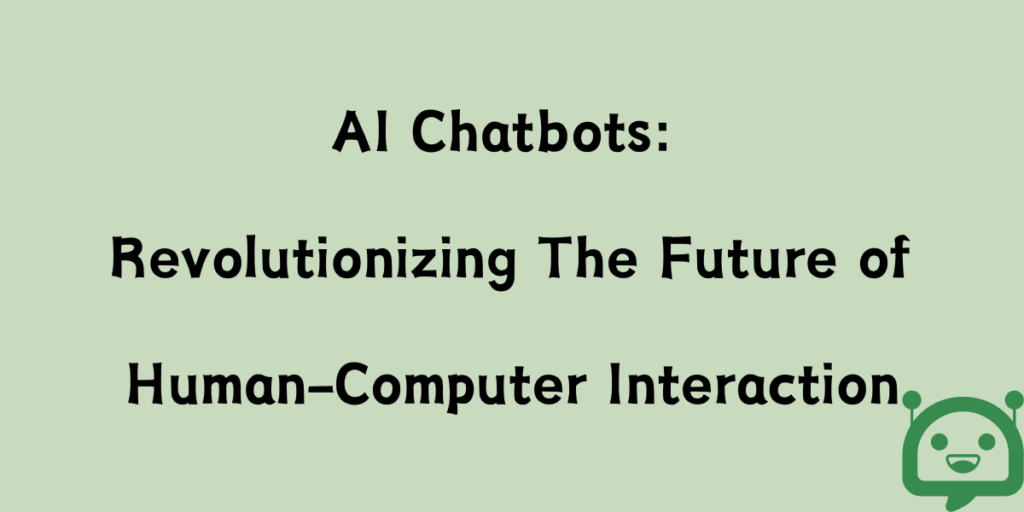In a world where digital interactions dominate, AI chatbots are at the forefront of transforming the way humans interact with machines. These intelligent systems are no longer confined to simple tasks like answering basic questions; they have evolved into sophisticated tools capable of understanding context, adapting to users’ needs, and enhancing the efficiency of communication. As technology continues to advance, AI chatbots are rapidly revolutionizing human-computer interaction, ushering in a future where seamless communication with machines becomes second nature. This article explores how AI chatbots work, their benefits, and their potential to reshape industries.
What Is AI Chatbot?
AI chatbot is a software application designed to simulate human conversation. Leveraging natural language processing (NLP) and machine learning, these bots can understand, interpret, and respond to user inputs in a way that mimics human communication. Whether it’s a standard customer service bot or more advanced systems like NSFW character AI, these tools cater to diverse user needs. Unlike traditional scripted chatbots, AI chatbots are intelligent and can learn from interactions to improve their responses over time, offering both general and specialized conversations.
How Does AI Chatbot Work?
At the heart of AI chatbots is a blend of cutting-edge technologies that allow them to process language, understand intent, and generate appropriate responses. The functioning of AI chatbots can be broken down into several critical steps, each contributing to the overall effectiveness of the interaction.
Natural Language Processing (NLP)
NLP is a cornerstone of AI chatbots. It allows these systems to comprehend human language in its written or spoken form. NLP is responsible for analyzing the user’s input by breaking down sentences, identifying grammatical structures, and extracting meaning. By doing this, chatbots can understand the intent behind a user’s question rather than just recognizing specific keywords, making interactions more fluid and human-like.
Machine Learning and Training Data
AI chatbots rely heavily on machine learning algorithms, which allow them to improve their performance over time. By feeding chatbots large datasets of human conversations, they can identify patterns, learn from user interactions, and predict the most appropriate responses. This continuous learning also applies to more sensitive areas, such as NSFW AI, where chatbots are designed to handle more explicit or adult-themed conversations, adapting to the complexity of user inputs with enhanced privacy controls.
Contextual Understanding
Contextual understanding is what sets advanced AI chatbots apart from basic automated systems. These chatbots can recall previous interactions with users, understanding the context of conversations and responding appropriately. For instance, if a user asks a follow-up question, a well-designed AI chatbot can refer to earlier parts of the conversation to give a relevant answer, fostering a more natural dialogue.
Common Benefits of Using AI Chatbots
AI chatbots have quickly become a valuable asset for businesses and organizations across the globe. Their ability to automate tasks, engage with users, and provide immediate responses has made them indispensable in various sectors.
There are several significant benefits to using AI chatbots:
- 24/7 Availability: AI chatbots offer round-the-clock support, ensuring that users can interact with businesses anytime, anywhere. This increases customer satisfaction and efficiency.
- Cost Efficiency: By handling a large volume of inquiries simultaneously, AI chatbots reduce the need for human agents, cutting down operational costs.
- Scalability: As businesses grow, AI chatbots can easily scale to meet increasing demands without sacrificing quality or performance.
- Personalization: Through the analysis of user data, chatbots can provide personalized responses that cater to individual preferences, enhancing the overall customer experience.
How Is AI Chatbot Transforming Customer Service?
AI chatbots are playing a pivotal role in redefining customer service by providing swift, accurate, and personalized interactions. With their ability to handle common queries efficiently, they are reducing response times and freeing up human agents to tackle more complex issues. Let’s explore some key elements of how AI chatbots are reshaping customer service.
Instant Responses and Continuous Support
One of the most significant advantages AI chatbots bring to customer service is the ability to provide instant responses. Unlike human agents, who may need time to process and answer queries, AI chatbots deliver immediate feedback. This instantaneous communication is critical in an age where customers expect fast resolutions to their issues. Additionally, their availability 24/7 ensures that businesses can maintain constant engagement with customers, even outside regular working hours.
Improved Accuracy and Reduced Errors
AI chatbots are highly accurate when it comes to delivering information or resolving customer issues. Thanks to their training on vast datasets, they are proficient in recognizing patterns and responding with relevant solutions. This reduces the likelihood of miscommunication or human error, especially in repetitive queries. Furthermore, AI chatbots can be continuously updated with the latest information, ensuring that customers receive the most accurate answers possible.
Personalization and Enhanced Customer Engagement
By using data analytics, AI chatbots can personalize interactions, offering customers tailored solutions and suggestions. This applies not only to typical business queries but also extends to niche markets, including those involving NSFW AI chat, where users may require more private or customized interactions. Such personalization improves customer satisfaction by ensuring that the conversation is appropriate for the context, whether in general customer service or more adult-oriented content.
Application of AI Chatbot
The applications of AI chatbots span across numerous industries, transforming the way businesses operate and communicate with their clients. From healthcare to e-commerce, chatbots are streamlining processes and enhancing user experiences.
Healthcare
In healthcare, AI chatbots are revolutionizing patient care. They assist with symptom checking, scheduling appointments, and even providing mental health support. By automating administrative tasks, chatbots free up healthcare professionals to focus on more critical duties while ensuring patients receive timely assistance.
E-commerce
AI chatbots are becoming a crucial tool in e-commerce by offering product recommendations, assisting with purchases, and handling customer inquiries. Their ability to process large volumes of transactions and provide personalized shopping experiences makes them an essential asset for online retailers. Moreover, chatbots help reduce cart abandonment rates by addressing customer concerns during the purchase process.
Education
In education, AI chatbots are helping both students and educators by automating tasks such as answering frequently asked questions, providing tutoring assistance, and managing administrative duties. They can act as virtual tutors, offering real-time help with academic subjects and creating a more interactive learning experience. For institutions, chatbots streamline operations, making information more accessible to students and staff alike.
What Is the Future of AI Chatbot?
The future of AI chatbots looks promising as advancements in technology continue to accelerate their capabilities. We can expect AI chatbots to become even more integrated into everyday life, with more human-like interactions, better contextual understanding, and expanded applications across various industries. As chatbots continue to learn and evolve, their role will shift from simply responding to inquiries to becoming proactive assistants that anticipate user needs and deliver solutions before they are even asked. This evolution will further blur the lines between human and machine communication, offering new possibilities for how we interact with technology.
Conclusion
AI chatbots are at the forefront of transforming human-computer interaction, offering innovative solutions across multiple industries. From improving customer service to enhancing e-commerce experiences, these intelligent systems are quickly becoming indispensable. As technology continues to evolve, so too will the capabilities of AI chatbots, paving the way for more advanced, seamless, and personalized interactions. The revolution has only just begun, and the future of AI chatbots holds boundless potential.






